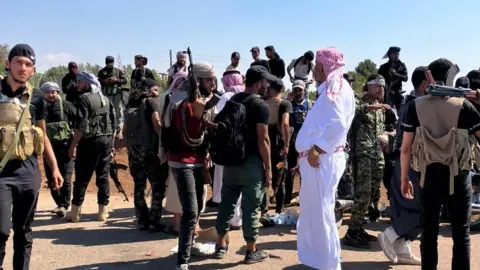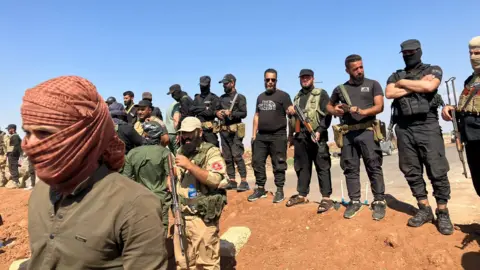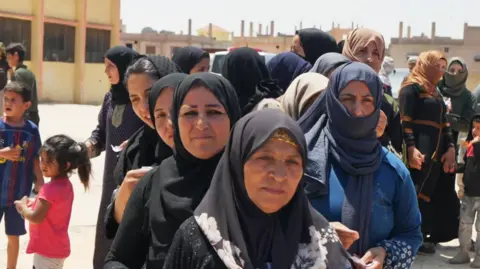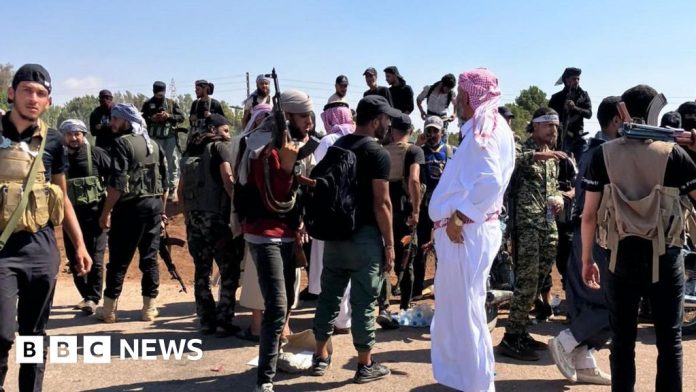Middle East correspondent
 BBC
BBCBedouin fighters positioned outside the southern Syrian city of Suweida have told the BBC they will observe a ceasefire with the Druze community there, but have not ruled out resuming hostilities.
The Bedouin fighters have retreated from the city to surrounding villages in the province after a week of deadly sectarian clashes between Druze fighters, Bedouins and government forces, with Israel carrying out air strikes in support of the Druze.
On Sunday a UK-based monitoring group said there was a “cautious calm” in the region – but later said tribal fighters had attacked villages.
From the town of al-Mazara’a – a Druze town until last week when it was taken over by the Bedouin and now under Syrian government control – smoke could be seen across the fields rising from Suweida city.
At a nearby checkpoint a mound of dirt cut across the road. Dozens of government security personnel were standing along it, all heavily armed and blocking the Bedouin from re-entering the city.
Hundreds of Bedouin fighters, many firing guns into the air, crowded the road.
They want the release of injured Bedouin people still in the city of Suweida, who they refer to as hostages. Otherwise, they say, they will force their way past the checkpoint and head back into the city.
“We did what the government have ordered us and we are committed to the agreement, and the government words and we came back, Suweida is 35km far from here,” a tribal elder told the BBC.
“Currently our hostages and wounded are there, they are refusing to give us anyone… If they don’t commit to the agreement we are going to enter again, even if Suweida will become our cemetery.”

Long-running tensions between Druze and Bedouin tribes erupted into deadly sectarian clashes a week ago, after the abduction of a Druze merchant on the road to the capital Damascus.
Interim President Ahmed al-Sharaa’s government responded by deploying forces to the city. Druze residents of Suweida told the BBC they had witnessed “barbaric acts” as gunmen – government forces and foreign fighters – attacked people. Israel targeted these forces, saying they were acting to protect the Druze.
Government forces withdrew and Druze and Bedouin fighters subsequently clashed. Both Druze and Bedouin fighters have been accused of atrocities over the past seven days, as well as members of the security forces and individuals affiliated with the interim government.
On Saturday, al-Sharaa announced a ceasefire and sent security forces to Suweida to end the fighting.
Local Druze fighters are once again in control of the city. But more than 1,120 people have been killed, the UK-based Syrian Observatory for Human Rights (SOHR) said.
The dead included 427 Druze fighters and 298 Druze civilians, 194 of whom were “summarily executed by defence and interior ministry personnel”, the monitor said.
Meanwhile 354 government security personnel and 21 Sunni Bedouin were also killed, three of them civilians who it said were “summarily executed by Druze fighters”. Another 15 government troops were killed in Israeli strikes, it said.

At least 128,000 people have been displaced by the violence, the UN migration agency said on Sunday. Suweida city has a severe medical supply shortage, the SOHR said.
A first humanitarian convoy from the Syrian Red Crescent has reportedly reached the city. Israel’s public broadcaster reported that Israel had sent medical aid to the Druze.
US Secretary of State Marco Rubio meanwhile has demanded that the government “hold accountable and bring to justice anyone guilty of atrocities including those in their own ranks” to preserve the possibility of a united and peaceful Syria.
In Mia’rbah, south-west of Suweida, Bedouin refugees gathered at what used to be a school. The village still bore the scars from years of civil war, with buildings lying in ruins and strewn with bullet holes.
At the aid distribution centres elderly Bedouin women collected water from a tank on the back of the truck. Most of the people there were women and children.
Asked whether she thought Bedouin and Druze could live together, one woman displaced from Suweida city said it would depend on the government in Damascus.
“They can live together if the government will take over and rule, and if the government will provide peace and security,” she said.
In the absence of government authority, she said she believed that Bedouin could not trust the Druze.
“They are traitors, without peace and security we can’t live with them,” she said.
Additional reporting by Jack Burgess


